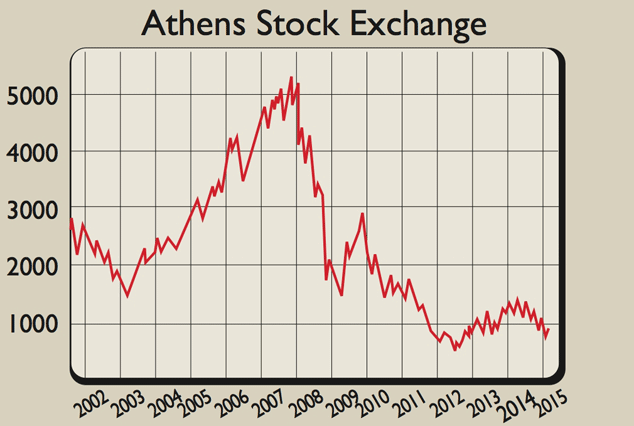Don’t panic – and buy into Europe
Greek turmoil is unnerving investors – and there’s lots to be nervous about. But I’m still buying Europe, says John Stepek.

Get the latest financial news, insights and expert analysis from our award-winning MoneyWeek team, to help you understand what really matters when it comes to your finances.
You are now subscribed
Your newsletter sign-up was successful
Want to add more newsletters?

Twice daily
MoneyWeek
Get the latest financial news, insights and expert analysis from our award-winning MoneyWeek team, to help you understand what really matters when it comes to your finances.

Four times a week
Look After My Bills
Sign up to our free money-saving newsletter, filled with the latest news and expert advice to help you find the best tips and deals for managing your bills. Start saving today!

Greek turmoil is unnerving investors and there's lots to be nervous about. But I'm still buying Europe, says John Stepek.
At MoneyWeek, we've been fans of investing in Europe for a while. And we have no intention of changing our minds now. At a time when a hard-left party has taken power in Greece, where all of this trouble started in the first place, you might think that's a little foolhardy. Are we mad? We don't think so we'll explain why in a moment. But it's easy to understand why investors are nervous.
As the Financial Times reports, following the Greek election of left-wing party Syriza on 25 January, the Greek equivalent of British chancellor George Osborne is Yanis Varoufakis, a "popular leftwing blogger who has lambasted the austerity programme imposed by international creditors". Meanwhile, the man charged with heading the negotiations with the "troika" (the eurozone's "bail-out" committee, comprising the International Monetary Fund, the European Commission and the European Central Bank) is a former communist party politician.
MoneyWeek
Subscribe to MoneyWeek today and get your first six magazine issues absolutely FREE

Sign up to Money Morning
Don't miss the latest investment and personal finances news, market analysis, plus money-saving tips with our free twice-daily newsletter
Don't miss the latest investment and personal finances news, market analysis, plus money-saving tips with our free twice-daily newsletter
And just to make things even more exciting, one of Greece's first foreign-policy decisions has been to question the need for any further sanctions on Russia over Ukraine, another potential source of discord with the rest of Europe.
The deadline approaches
None of this will make for easy negotiations over Greece's debt burden in the coming months. Syriza wants many things, mainly boiling down to higher public spending and a general "no" to austerity measures. But the headline grabber is the goal to write off most of Greece's national debt, which, at over €319bn (€240bn of which was extended by the troika), stands at 175% of GDP. That's nerve-wracking enough for anyone who is owed money by Greece and it's certainly not something that the rest of Europe wants to encourage, in case other countries ask for the same.
But there's also the fear that if talks over how to deal with the Greek debt break down, the Greeks might just turn around and default unilaterally. Technically, this is possible, as Greece is running a small primary surplus (ie, its tax revenues cover all public spending excluding interest payments), although reality dictates that the country would have to borrow again before long, particularly given Syriza's spending ambitions.
In any case, as a result of all this, no one wants to have any investment exposure to Greece right now. The yield on Greek bonds is rising hitting around 10% on the ten-year Greek government bond by mid-week. And Greek stocks (as judged by the Athens Stock Exchange General index) had a terrible year in 2014, and have only continued to slide since Sunday's election (as the chart below shows).

The Greek banks (three of which failed the European Central Bank's stress tests last year) have led the fall, amid concerns about money fleeing the system. In fact, the Athens Bank index (which covers the country's five largest banks) is now trading at an all-time low. One JP Morgan analyst reckons that possibly 10% of Greek bank deposits have already left the country this year, while international banks have no desire to be caught short lending to Greece.
This effectively leaves the banks dependent on money provided by the European Central Bank (ECB) and that tap could be turned off if talks go badly. That would result in Greece leaving the eurozone and returning to using the drachma.
There isn't much time before the issue comes to a head. Greece's €240bn troika bail-out expires at the end of February. If it doesn't get an extension by then, we could be on the road to a "Grexit".
Cool heads will probably prevail
Sounds scary. But so far during this crisis it's been a mistake to underestimate eurozone pragmatism. The desire to hold the region together has so far trumped all other instincts, and that remains the most likely scenario now. As the FT notes, Alexander Stubb, Finland's prime minister, has said that "we will not forgive loans but we are ready to discuss extending the bail-out programme or maturities". Andrew Lilico of Europe Economics, writing in The Daily Telegraph, says: "Greece's debts won't be forgiven, but they could be extended pretty much indefinitely". At the same time, Greece is "preparing a broad-based crackdown against tax evasion and corruption", notes the FT so the idea that it's beyond reform isn't the case.
"Daniel", writing on the Crooked Timber blog, makes some important points. The Greek debt burden, he says, is no longer an "economically meaningful number". Instead, it's "a political quantity; it's part of the means by which control is exercised over the Greek budget" by the rest of Europe.
In other words, everyone involved in this discussion knows that the debt as it stands can't be paid off, and that if they want Greece to stay in the eurozone the rest of Europe is going to have to pay at least part of that bill be it through haircuts, or giving them a lot longer to pay. But at the same time, they can't just write off the debt as that would mean relinquishing all of their ability to push Greece in the direction of reform.
This goes to the heart of the European problem you can't have lasting monetary union without political union. For monetary union to work, the wealthier parts of the union have to be willing to subsidise the poorer parts. And that's why you need political union it's one thing for taxpayers in the wealthy parts of the US to subsidise the poorer states, given that they all get to vote inthe same elections.
However, it's quite another to try to sell a German voter the idea of funding an early retirement for a Greek civil servant. In the very long run, this fundamental flaw iswhat will ultimately lead the eurozone to split, once the challenges to further political integration simply become too great to surmount.
But in the meantime, some sort of fudge seems likely. As James Mackintosh points out in the FT, there is no need for a "me too" domino effect from this, with other countries demanding the same "lenient" treatment. "Smart spinning of the deal should avoid the need to repeat. After all, none are suffering anywhere near as much as Greece, where a quarter of the workforce is unemployed."
A failure of fudge
But what if the fudge finally fails this time? An exit from the eurozone is the worst-case scenario, and many are painting it as a disaster in the making, particularly given the risk to the Greek banking sector. Yet as Crooked Timber points out, it doesn't need to be. It's easy to forget now, but a major Portuguese bank Banco Espirito Santo failed and had to be restructured last year. It was dealt with over a weekend, with barely a blip. "That's the stress test that matters." Equally, the ECB has now started printing money. Any Grexit would merely encourage the ECB to print even more.
So as Crooked Timber puts it, a Grexit might result in a "massive risk-off trade", but it "would be the mother of all buying opportunities" because the market would quickly realise that "the actual effect on the eurozone was heavily quarantined".
And if Greece's creditors buckle instead, and actually write off a significant amount of Greek debt (however unlikely that seems now) well, that would just be a much more upfront version of what QE is doing using printed money to pay off sovereign debts. "So my view is, I guess, that if you can close your eyes and open them again in January 2016, you buy eurozone risk and hold it."
Should you buy the Greek market?
Let's not be too blas about this. These negotiations will be fraught. They might take a long time, and there will be plenty of ups and downs along the way. Syriza might be a lot less pragmatic than anyone expects, and there is potential for another election should its policies disappoint voters, or result in the party splintering. But we certainly wouldn't let that put you off investing in other European countries.
Of course, if you are feeling very bold indeed, you could even buy into the Greek stockmarket. It trades on a cyclically adjusted price/earnings (Cape) ratio of around three, and performed spectacularly after hitting that sort of level back in 2012, but it lost a lot of that ground last year as fear over the elections flared up.
It would be a brave investor indeed who bet on that happening again (at a Barclays presentation this week, the creator of the Cape, Professor Robert Shiller, flagged it up as a potentially "spectacular investment", but even he pulled back from wholeheartedly recommending the market). But if you feel like a punt, then you can buy in via the Lyxor FTSE Athex 20 (Paris: GRE).
For those looking for something a little less high octane than a bet on a market with an outside chance of imposing capital controls, James Ferguson and Dr Matthew Partridgelook at other promising European bets.
Get the latest financial news, insights and expert analysis from our award-winning MoneyWeek team, to help you understand what really matters when it comes to your finances.

-
 Should you buy an active ETF?
Should you buy an active ETF?ETFs are often mischaracterised as passive products, but they can be a convenient way to add active management to your portfolio
-
 Power up your pension before 5 April – easy ways to save before the tax year end
Power up your pension before 5 April – easy ways to save before the tax year endWith the end of the tax year looming, pension savers currently have a window to review and maximise what’s going into their retirement funds – we look at how